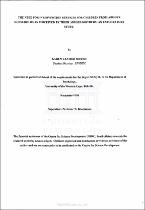| dc.description.abstract | The high incidence of domestic violence both internationally and locally begs the question as to the impact on and need for intervention services for the children growing up in violent homes. In response to this need for services in this area, the National Institute for the prevention of Crime and Rehabilitation of offenders, Women's Support Centre (NWSC) is currently considering the extension of their current services to the children of their clients who have been exposed to domestic violence. So as to promote and inform more effective intervention services in consultation with the community, the current study explores the range of needs of the children of abused women, establishing whether there is a need for services and how the NWSC can best go about meeting the identified needs as identified by
abused mothers who are stakeholders in the NWSC. Action research community psychology and ecosystemic principles play a central role in this research. Participants were all NWSC clients who had experienced abuse in their intimate relationships and who are mothers to children who had been exposed to the domestic violence. Data was collected from two sources, that of Needs Assessment forms (consisting of open-ended and multiple choice questions) and three open-ended,( semi-structured 90 minute focus group interviews which were run at the centre. In both cases, there was collaboration with and input by NWSC staff one of whom co-facilitated in the focus group interviews. Twenty-one women completed the needs assessment forms. Thirteen women participated in the mixed-race focus
groups. In this study commonly observed short term effects include deficits in functional and emotional capacity, psychosocial functioning and the implementation of inadequate coping- and problem-solving strategies. Reported long term effects include a propensity to either commit (or be the object of) violence and abuse in subsequent intimate relationships, or to become prone to conduct problems and substance
abuse.
In addition, many children are involved in multiple ways in the abuse- either by being physically or emotionally abused themselves, being identified as a precipitant for the abuse, or intervening physically or verbally to stop the abuse of their mothers. Children are therefore never mere witnesses. However, not all children are condemned to become abusers themselves or to manifest with maladaptive coping mechanisms in response to their exposure to domestic violence. This is evident in several reports of children's displays of resilience despite their adverse home and family circumstances. The great degree of overlap of coping mechanisms between different children suggests that such variable responses are more likely a function of individual attributes and personality characteristics and the
degree of available external support systems rather than a function of age or gender per se.
Overall, the findings highlighted that there is a definite need and support by NWSC clients for the proposed extension of the NWSC programme to improve intervention services for children. These findings also expanded on the on the of domestic violence on children by identifying a number of ameliorating and exacerbating influences which mediate its impact and help inform the implementation of future community relevant programmes with such children. Maternal education and support such as the counselling which the NWSC can hopefully provide are amongst such processes which can help to ameliorate the impact of domestic violence on children and foster greater resilience. A number of recommendations are made regarding parent-child programmes, community, legal, government, societal interventions and future research. Ecosystemic theory provides a valuable framework for understanding the impact of domestic violence on children and for informing interventions which address the multiple systemic levels both within and outside of the family which contribute towards the creation and perpetuation of domestic violence. With the extension of intervention services to the children of abused women, the NWSC with the support of its client stakeholders has the potential to contribute much of value in this regard. | en_US |

